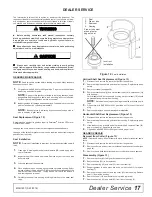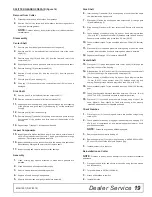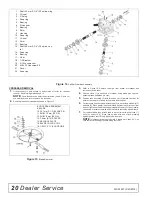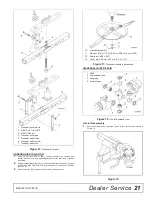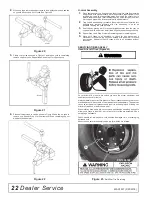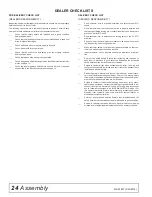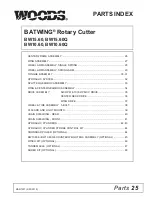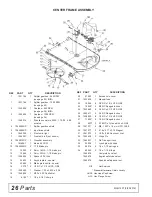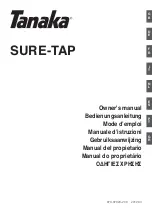
Operation
11
MAN1257 (3/23/2018)
5.
Repeat the process until the driveline can be connected. The point at
which the driveline can be connected is the maximum turn that should be
made.
Cutting Height Adjustment
NOTICE
■
Avoid ground contact with blades. Striking ground with blades
produces one of the most damaging shock loads a cutter can encounter.
If this occurs repeatedly, the cutter, driveline, and gearboxes will be dam
-
aged.
Cutting height range is from 25 mm to 381 mm. A hydraulic cylinder is used for
cutting height adjustment.
When selecting a cutting height, you should consider the area of operation. If
the ground is rolling and has mounds the blades could contact, set the cutting
height accordingly. The cutting height (blade edge) is approximately 25 mm
above the bottom of the side skid.
Cutting Height (Normal Mowing) - Center Section
1.
Position the cutter on a hard level surface and select an approximate
cutting height, Example 150 mm.
2.
Raise wings and lock them in the UP position.
3.
Raise or lower the center section to obtain a distance of 127 mm from
bottom edge of skid shoe to the ground.
4.
Loosen jam nuts on the attitude rod that runs from the wheel yoke to the
tongue.
5.
Adjust rod in or out until the rear of the cutter is approximately 12 mm
higher than the front.
6.
Tighten jam nuts against sleeve.
Cutting Height (Normal Mowing) - Wings
1.
Lower wings to normal mowing position.
2.
Loosen the jam nut on the adjustable link (turn buckle).
3.
Lengthening the link will raise the wing, shortening the link will lower the
wing. The rear edge of the wing should be parallel to the ground.
When using the cutter to shred, the rear of the cutter deck should be approxi
-
mately 12 mm to 25 mm lower than the front.
TRACTOR OPERATION
Use care when operating around tree limbs and other low objects. Avoid being
knocked off tractor and being injured.
Only use a tractor with a Roll Over Protection Structure (ROPS) and seat belt.
Securely fasten seat belt.
The cutter is operated with tractor controls. Engage the PTO at a low rpm to
prevent excessive loads on the cutter drive system. Increase throttle to recom
-
mended PTO operating RPM.
Be sure operator is familiar with all controls and can stop tractor and cutter
quickly in an emergency. The operator should give complete, undivided atten
-
tion to operating tractor and cutter.
CUTTER OPERATION
When beginning operation of the cutter, make sure that all persons are in a
safe location.
Power for operating the cutter is supplied by the tractor PTO. Operate PTO at
540 (1000 RPM for "Q" models).
Know how to stop the tractor and cutter quickly in an emergency.
Engage PTO at a low engine, rpm to minimize stress on the drive system and
gearbox.
With PTO engaged, raise PTO speed to 540 or 1000 RPM depending on model
and maintain throughout cutting operation.
Gearbox protection is provided by a slip clutch with replacement fiber disc. The
slip clutch is designed to slip when excessive torsional loads occur.
Move slowly into material. Adjust tractor ground speed to provide a clean cut
without lugging the tractor engine.
Use a slow ground speed for better shredding.
Proper ground speed will depend on the terrain and the material’s height, type,
and density.
Normally, ground speed will range from 3 to 8 km/h. Tall, dense material should
be cut at a low speed; thin, medium-height material can be cut at a faster
ground speed.
Always operate tractor PTO at proper RPM (540 or 1000 depending on model)
to maintain blade speed and to produce a clean cut.
Under certain conditions tractor tires may roll down some grass and prevent
cutting at the same height as the surrounding area. When this occurs, reduce
your ground speed but maintain PTO at 540 or 1000 RPM. The lower ground
speed will permit grass to rebound partially.
Mowing Tips
Look down and to the rear and make sure area is clear before operat
-
ing in reverse.
Do not operate or transport on steep slopes.
Do not stop, start, or change directions suddenly on slopes.
Use extreme care and reduce ground speed on slopes and rough ter
-
rain.
Watch for hidden hazards on the terrain during operation.
Stop power unit and equipment immediately upon striking an
obstruction. Turn off engine, remove key, inspect, and repair any damage
before resuming operation.
Maximum recommended ground speed for cutting or shredding is 10 km/h
miles per hour. Adjust tractor ground speed by using higher or lower gears to
provide a clean cut without lugging tractor engine.
Tall material should be cut twice. Cut material higher the first pass. Cut at
desired height at 90 degrees the second pass.
Remember, sharp blades produce cleaner cuts and use less power.
Before entering an area, analyze it to determine the best procedure. Consider
the height and type of material to be cut and the terrain type (hilly, level or
rough, etc.).
Shredding
The cutter may be used to shred various crops including green manure, straw,
stubble, asparagus residue, corn stalks and similar crops in preparation for till
-
ing. It may also be used to shred pruning in orchards, groves and vineyards.
Each shredding operation may require a different set-up. Start with front edge
of cutter high. Adjust up or down as necessary with attitude rod. Experiment
until you obtain the results you want.
When shredding attitude is set, check that the distance from the bottom rear
edge of the wing to the ground matches the bottom edge of the rear center sec
-
tion to the ground.
TRANSPORTING
Power unit must be equipped with ROPS or ROPS cab and seat belt.
Keep seat belt securely fastened. Falling off power unit can result in
death from being run over or crushed. Keep foldable ROPS system in
“locked up” position at all times.
Always raise unit and install transport locks before transporting.
Leak down or failure of mechanical or hydraulic system can cause equip
-
ment to drop.
Always attach safety chain to tractor drawbar when transporting unit.
Never exceed 20 mph (32.2 km/h) during transport.
Never allow riders on power unit or attachment.
Do not operate PTO during transport.
Do not operate or transport on steep slopes.
Do not operate or transport equipment while under the influence of
alcohol or drugs.
WARNING
WARNING
CAUTION
CAUTION
WARNING
Summary of Contents for Batwing BW10.60E
Page 9: ...Declaration of Conformity9 MAN1257 3 23 2018...
Page 30: ...30 Parts MAN1257 3 23 2018 TONGUE ASSEMBLY...
Page 54: ...BATWING FAUCHEUSE ROTATIVE MAN1257 R v 23 03 2018 BW15 60E BW15 60QE BW10 60E BW10 60QE...
Page 62: ...D claration de conformit 9 MAN1257 23 03 2018...
Page 76: ...BATWING TRINCIATRICE ROTANTE MAN1257 Rev 23 03 2018 BW15 60E BW15 60QE BW10 60E BW10 60QE...
Page 84: ...Dichiarazione di conformit 9 MAN1257 23 03 2018...
Page 98: ...BATWING ROLLSCHNEIDER MAN1257 Rev 23 03 2018 BW15 60E BW15 60QE BW10 60E BW10 60QE...
Page 106: ...Konformit tserkl rung 9 MAN1257 23 03 2018...
Page 120: ...BATWING DESBROZADORA GIRATORIA MAN1257 Rev 23 3 2018 BW15 60E BW15 60QE BW10 60E BW10 60QE...
Page 128: ...Declaraci n de conformidad 9 MAN1246 14 12 2017...

















